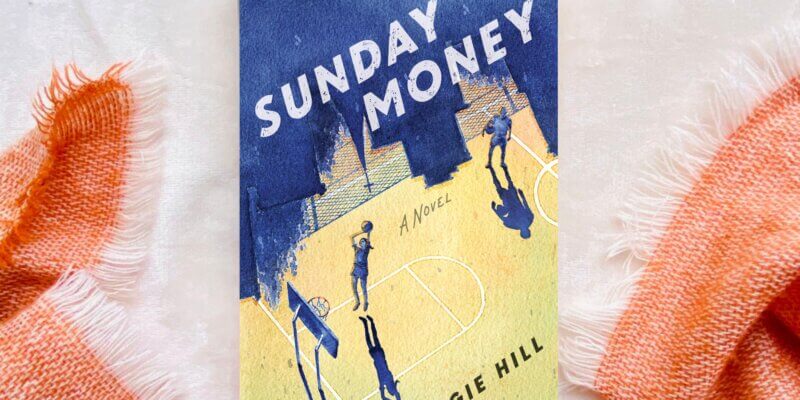Welcome back, friend! Yesterday, I shared about Sunday Money, a coming of age story about a young girl who loves basketball. It is one of my favorite books this year. Today, I am excited to bring you this interview with Maggie Hill! Let’s learn the inside story behind this beautiful book. 🙂

Sunday Money
It’s 1971, but for Claire Joyce and girls’ basketball, it might as well be 1871. Stilted rules (three-bounce dribbling, two roving players for full-court games, and uniforms that include bloomers) set their play unfairly apart from the boys’ basketball Claire’s older brother John has trained her in.Basketball is the only constant in Claire life, and as she enters her teen years the skills she’s cultivated on the court—passing, shooting, and faking—help her guard against the chaos of an alcoholic mother, an increasingly violent younger brother, and the downward spiral her beloved John soon finds himself unable to climb out of. Deeply cut from the cloth of the Catholic Church, Brooklyn’s working class, and the limited expectations her world has for girls, Claire strives to find a mirror that might reflect a different, future self. Then Title IX bounces on the scene. Suddenly, girls’ basketball becomes explosive, musical, passionate, and driven—and if Claire plays it just right, it just might offer a full ride to a previously out-of-reach college.Sunday Money follows Claire as she narrates her way through 1970s Brooklyn, hustling on and off the court and striving to break free of the turmoil in her home and the rulebook “good” girls are supposed to follow.
Get to know the author: Maggie Hill
Hi Maggie! It is a pleasure to have you on Armed with A Book. Please tell me and my readers a bit about yourself.

Hi Kriti and readers! I’m so glad to be here. A little bit about me: I’m a wife and mother, teacher, writer, worker, loyal and true friend. This is my first novel. It’s a thrill and an honor that you will read it. Thank you!
Sunday Money is set in 1971 Brooklyn. What inspired you to write about this particular setting and era?
I wanted to capture the time just prior to Title IX, before the girls’ basketball rules changed, before girls had athletic scholarships available to them for college.
I love the title: Sunday Money. What made you pick Sunday Money as the title? Did you have any other titles in mind?
I hope that as a reader moves along in the story, they will be able to link the title with the meaning the narrator gives it. It comes up a few times along the way….and means certain things each time.
When did you start working on this book? How was the first draft different from the final one?
What a great question. I started writing this after I saw a very powerful, exciting women’s professional basketball game. I imagined the players starting out, and I had a memory of my own to add to it – and off the story went! From first draft to final, the seed of gaining some form of mastery of basketball, of life and how to live it, picked up momentum.
Claire’s narrative voice is central to the novel’s storytelling. Did you always plan on using first-person narration or did you have other ideas when you first pondered the idea for this novel?
Another great question. Claire was telling this story, and that was it. I tried it a variety of ways – third person, multiple narrative perspectives – but ultimately, her raw truth needed to carry it along.
The 1970s was a transformative decade for women’s rights and opportunities in the United States of America. Tell me about your research for this novel.
It was fun and astounding to find how much we take for granted in today’s world. Well, the percentages of equal pay still don’t compute, but looking at the opportunities for women in the 1970s as compared to the, say, 2020s – it may as well be a science fiction story. Just look at how basketball has evolved only this year! The college women’s national finals had more than two million more viewers than the men’s national finals. Nobody in the 1970s would have believed that statistic!
I loved the familial bonds in this book. Claire’s family dynamics, including an alcoholic mother, an absent father and a violent younger brother, added layers of complexity to her story and influenced her growth into an adult. Tell me about writing these characters.
It was important for the main character to live a truly loving yet fractured by difficulty life – or it was important for me as a storyteller to give Claire those dynamics. How they appear and then evolve through the story was a process of planning and surprise, believe me. If I were to give this story its own life, I had to follow the path it was taking. Not always where I wanted to go, but diligently went.
Did you bring any of your experiences into this book?
Sure. I was guided by what I know of being a young girl, being a friend, being awful at basketball! Certainly, I was inspired by some things I already knew, but the story is not directly modelled on those things. I ended up rooting for these characters as if I were reading them, which probably sounds weird!
Do you have a favourite quote or scene in Sunday Money that you find yourself going back to?
“Just do your job.”
If you read it, you’ll know what I’m talking about.
Thank you so much for taking the time to chat with me and share with my readers.
Thank you! Such good questions.
Thanks for joining us! Connect with Maggie on Goodreads.
I hope you will check out Sunday Money on Goodreads. Read my review here.

Be First to Comment